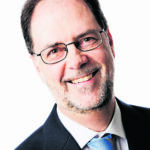‘Folkemødet’ is not a term that translates easily. On its official website it’s called ‘The People Meeting’ – but while that is a literal translation, it doesn’t really describe what goes on during the second weekend in June in the small tourist resort of Allinge on the north coast of Bornholm.
Everybody who’s anybody
Firstly, it’s more like a festival than a meeting; and secondly many critics contend that it’s not ‘the people’ who participate, but rather the political in-crowd from Copenhagen who simply move to Allinge for a long weekend.
There is some truth to that claim – everybody who’s anybody in politics and media is there. But so is everyone else – including people like myself and loads of people who are actively engaged in trade unions, patient organisations, NGOs or charitable organisations, political parties … you name it. And for all of us, it’s a fantastic opportunity to meet, mingle, discuss, network – and perhaps even have one beer too many …
Close to the top
At any given time during Folkemødet, if you sit down at the harbour front in Allinge, within an hour you’ll probably see at least three or four ministers and even more former (or coming) ministers, as well as a handful of the absolute top level of Danish CEOs and leaders from all kinds of organisations. And if you want to strike up a conversation, most are happy to engage for a minute or two – if they’re not too busy running from one event to the next.
It is a fantastic demonstration of the short distance we have between the ordinary citizen – ‘the people’ if you will – and the top echelons of society.
In light of the ongoing debate – and the events in Copenhagen in February – it’s clear that this fantastic gift is not something Denmark can take for granted in the future. However, the primary threat to Folkemødet isn’t a handful of extremists trying to find a platform, but rather the media’s insistence on covering only the same extremists – thus creating exactly the platform they crave.
Stephen, the executive director of the American Chamber of Commerce in Denmark, is a veteran expat who has lived in Denmark more than 30 years. AmCham is the voice of international business, and Stephen writes about issues affecting international companies in Denmark and the people working for them.
















